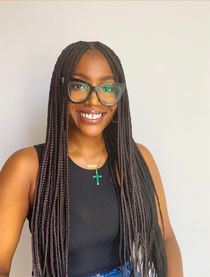BOSS UP

Ad
When Ashley Harmon, founder and CEO of Mela Vitamins, was diagnosed with Polycystic Ovary Syndrome (PCOS) during her freshman year of college, she was finally able to put a name to the troubling symptoms she had been experiencing for years.
“I was constantly bloated, and my skin was breaking out,” she told xoNecole. “And I was so tired I struggled getting out of bed in the morning.”
After finding a naturopathic doctor to correctly diagnose her with PCOS and a vitamin D deficiency, Harmon began the long process of understanding her condition and learning to heal her body. “There are still many unanswered questions about why people develop PCOS and how to treat it,” she said. “The most frustrating part is that there are so many options and medications and that it takes some trial and error to find what works for each person’s body.”
Harmon spent years experimenting with prescription medications that had adverse side effects and high out-of-pocket costs and soon decided to reclaim control over her health and create supplements that were tailored to her needs. “I spent years ordering different ingredients and testing different formulas until I found a mix that worked,” she recalled.
“While I enjoyed making supplements for myself, I didn’t plan on creating a business around it,” Harmon added. But after discovering the disproportionate impact that COVID-19 had on immune-compromised individuals and those with vitamin D deficiency, Harmon was determined to launch a business that produced affordable, high-quality multivitamins with sufficient vitamin D levels and met the unique nutritional needs of Black and Brown people at large.
“The CDC and other health institutions estimate that anywhere from 76-90% of us are [vitamin D] deficient,” she said. “This can have a tremendous impact on our day-to-day health, and can also increase our long-term risk of breast cancer, dementia, and other diseases that already disproportionately impact Black women.”
Despite the common nature of this deficiency, Harmon has found that the wellness industry still has room to grow in prioritizing the health needs of people of color. With Mela Vitamins, Harmon aims to fill the gap within this supplement space with a daily essential multivitamin that caters especially to melanated women.
“My hope is that if you are struggling with an illness or just aren’t feeling well, that you empower yourself with knowledge, seek support from your healthcare team, and engage with a community that supports you,” she added. “You can and deserve to build a future where you feel like your best self.”
Harmon talked more about her business journey and her desire to fill a much-needed void in the market for Black and Brown women.
xoNecole: Could you give us some insight into your journey going from a traditional career path into entrepreneurship?
Ashley Harmon: I started my career in consulting, then transitioned into working at two different startups. With that being said, entrepreneurship is not easy at all. I absolutely love the work we are doing at Mela Vitamins, and the amazing community we have built, but it is really challenging. It is difficult to create a new path and niche in a billion-dollar industry that does not prioritize melanated people.
I do not look like most wellness company founders, and I did not start with a big financial backing. It was challenging to find business and manufacturing partners, but we pushed through. Now, we continue to grow our community of supporters while changing the narrative and making space for people of color in the wellness and supplement industries.
"I do not look like most wellness company founders, and I did not start with a big financial backing. It was challenging to find business and manufacturing partners, but we pushed through."
Courtesy of Mela Vitamins
With Mela Vitamin, Ashley Harmon aims to fill the gap within this supplement space with a daily essential multivitamin that caters especially to melanated women.
xoN: The statistics around vitamin D deficiency in Black women are striking. What were the key considerations in formulating a product tailored to the unique needs of women of color from a holistic approach?
AH: The statistics around vitamin D deficiency in Black women is an important topic that isn’t discussed enough. At Mela, we started with the nutritional deficiencies common among women of color and then built out the formula by actually listening to our community.
We spent a year doing consumer focus groups and speaking with women in our community to understand what their health and wellness goals are, and what benefits they wanted from a multivitamin. That is how we arrived at our key focus areas - stress management and mental focus, blood sugar management, digestion, and skin/hair health.
xoN: You're also a 2023 recipient of the Glossier Grant Program. How has this grant helped to fund and support the vision of Mela Vitamins?
AH: Glossier’s Grant Program has had a tremendous positive impact on our company and me personally. Glossier has provided Mela with much-needed resources to support us in launching our next product that will be out early [this] year. There are so many competing priorities, opinions from experts, and general trends in the wellness and beauty industries that I am trying to work through on a daily basis.
Glossier has supported my vision to grow Mela Vitamins to be the go-to wellness brand for melanated people. We have created a new niche within the wellness and beauty supplement industry that has been largely underserved, and I want us to continue to be the leaders driving research and innovation in this area.
Courtesy of Mela Vitamins
"We have created a new niche within the wellness and beauty supplement industry that has been largely underserved," says the founder of Mela Vitamins, Ashley Harmon.
xoN: What’s something that you’ve learned along your journey with PCOS that you would like to impart to other women dealing with this condition?
AH: Through my own journey, I have learned that you have to advocate for yourself. You know your body better than anyone, so if you know something is wrong, do not stop until you find a doctor or healthcare provider that will listen to your concerns and work with you to come up with a diagnosis and treatment plan.
People with PCOS and any chronic illness really, also need products from companies that are committed to offering natural and clean solutions that are based on research and data. We are already bombarded with so much confusing and conflicting information, that we need products and companies that are honest and transparent with the solutions they offer.
I have learned that many of the products that are marketed to us are not actually made for us, or worse, they are actually harmful. While it is unfair that we have to do so much research and testing on our own, it is the best chance we have of understanding and healing our bodies.
Let’s make things inbox official! Sign up for the xoNecole newsletter for daily love, wellness, career, and exclusive content delivered straight to your inbox.
Featured image courtesy of Mela Vitamins
ALSO ON XONECOLE


